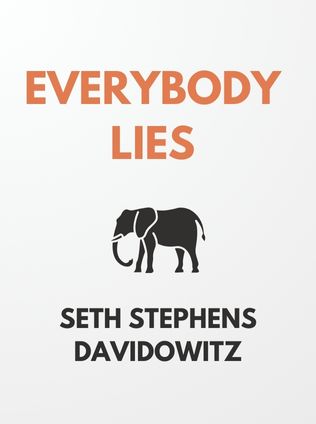
Everybody Lies
Big Data, New Data, and What the Internet Can Tell Us About Who We Really Are
By Seth Stephens-Davidowitz
Published 05/2017
About the Author
Seth Stephens-Davidowitz is an American data scientist, economist, and author who has carved out a niche in the field of big data analysis. He holds a Ph.D. in economics from Harvard University, which provided him with a robust foundation in statistical methods and economic theory. His professional journey includes working as a data scientist at Google, where he honed his skills in analyzing vast amounts of data, and contributing to The New York Times, where he shared insights derived from data analytics. Stephens-Davidowitz is known for his unique ability to merge technical expertise with a deep curiosity about human behavior, which is evident in his writing.
Stephens-Davidowitz's work is driven by a desire to uncover truths that are often hidden beneath the surface of social conventions and self-reporting biases. His approach is both rigorous and innovative, challenging traditional methods of social science research. He is particularly interested in how data from seemingly mundane activities—like Google searches—can reveal profound insights into our thoughts, desires, and behaviors. In his book "Everybody Lies," he explores these themes extensively, offering readers a new way to understand the world around them.
Main Idea
The central premise of "Everybody Lies" is that people reveal their true selves more accurately through their online behavior than they do through traditional surveys or in-person conversations. Stephens-Davidowitz argues that big data, particularly data derived from search engines like Google, provides an unprecedented window into human psychology. He suggests that this data can be used to gain insights into various aspects of society, including sexuality, racism, health, and even the likelihood of criminal behavior.
The author posits that big data has the potential to revolutionize social science research by offering new types of information, greater honesty in responses, high-resolution insights, and easier methods for establishing cause-and-effect relationships. However, he also acknowledges the potential drawbacks and ethical concerns associated with big data, such as the risk of false correlations, the dangers of data for data's sake, and the possibility of exploiting individuals based on their data.
Table of Contents
- Introduction
- The Revolution in Social Science
- New Types of Data
- The Power of Big Data
- The Limits and Dangers of Big Data
- Big Data and the Future
- Conclusion
Introduction
In the introduction of "Everybody Lies," Stephens-Davidowitz sets the stage by discussing the limitations of traditional social science methods. He points out that people often lie or misrepresent themselves in surveys and interviews, leading to skewed data and inaccurate conclusions. However, he argues that the advent of big data, particularly from sources like Google searches, offers a more truthful and comprehensive view of human behavior. This data, he suggests, is not only vast in quantity but also rich in variety, covering a wide range of topics and revealing insights that were previously inaccessible.
The Revolution in Social Science
Stephens-Davidowitz argues that big data is revolutionizing social science research by providing new types of information that were previously unavailable. Traditional data sources, such as surveys and interviews, are often limited by the willingness of participants to be honest and the scope of questions asked. In contrast, big data captures real-time information from millions of people, offering a more accurate and nuanced picture of society.
Sign up for FREE and get access to 1,400+ books summaries.
You May Also Like
The Subtle Art of Not Giving a F*ck
A Counterintuitive Approach to Living a Good Life
By Mark MansonHow To Win Friends and Influence People
The All-Time Classic Manual Of People Skills
By Dale CarnegieFreakonomics
A Rogue Economist Explores the Hidden Side of Everything
By Steven D. Levitt and Stephen J. DubnerQuiet: The Power of Introverts
The Power of Introverts in a World That Can't Stop Talking
By Susan Cain



















